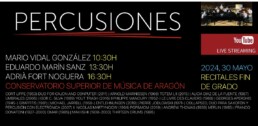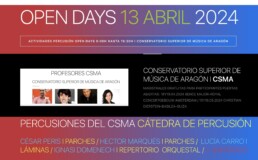Luna Nueva 2000
This is a work that reveals the freakiest side of Jesús Rueda, his bizarre part. Towards 1999 a more urban idea of percussion, drums, tires, scrap metal, etc., in an irresistible attraction for garbage or for the apparently discarded. The title New Moon responds to the ritual part of the work, mystery of the dark night, the poetic meaning that a night without a moon is present in this piece.
The work immerses itself in the search for sounds, timbres and rhythms beyond the traditions of cultured music. Make an approach to pop without fear of transferring part of its languages and forms to auteur music. The composer, needing to break away from symphonic instruments to arrive at a more urban, more radical sound, leads the score with the phrase
Discovering the possibilities of a drum
As almost always in Jesús Rueda’s music, the search for symbols and representations goes beyond the music itself. In this case, the recurring idea is that of a «distant howl on a moonless night», with allusions to plastic art, like some drawings by Paul Klee. It is curious how in Rueda we also find certain plastic similarities with the most schematic and abstract works of the painter, especially in the first sketch on graph paper of Luna Nueva. Ritual idea, instrumental ara, tribal extasy through repetition.
In the work there are two differentiated sections, the first one entrusted to two oil drums, of different sizes with which a percussion space is created, delimited with three touch points on each drum a wooden platform between them, forming a kind of ara. In the displacement generated by the movement to reach these specific points, a kind of ancestral dance is generated. It is an ecstatic and cathartic movement, which is sped up and ritually charged. The second section is announced by the sounds of metal instruments, prolonged, stopped. They are like warning chimes generated without bells.
The instrumental template does not have a fixed scheme but is a suggestion for the interpreter based on the timbral, color and height, giving the percussionist freedom to create their own set, as long as it responds to the needs raised. On a continuum of fusas, ostinato, the speech is fragmented without losing the pulse of fusas. It is a tour de force in which time and sound events accelerate.
Recording date I 11.05.2012
Place I Auditorio Eduardo del Pueyo Zaragoza-Spain
Music I Luna Nueva 2000
Autor I Jesús Rueda
Catalogue I Setup I Advanced percussion
Production I Cátedra de Percusiones CSMA
Realization I Cátedra de Percusiones CSMA
Recording Edition I Oscar Adán
Direction I Cátedra de Percusiones CSMA
Cátedra de Percusión I Percusiones del CSMA
Percussion Chair I César Peris I Lorenzo Ferrandiz I Francisco Inglés
CONSERVATORIO SUPERIOR DE MÚSICA DE ARAGÓN
Performed by I Hector Marqués Marqués
«One of the most attractive authors of his generation» AUDIOCLASSIC December 2011
«Rueda is much Rueda and his music does not go unnoticed. […] It is true that Rueda takes his time, but in his case the wait is always worth the regret. […] His musical talent is exceptional «Juan Ángel Vela del Campo from EL PAÍS.
Jesús Rueda
Jesús Rueda was born in Madrid in 1961. He studied piano with Joaquín Soriano at the Royal Superior Conservatory of Music of the Capital and Armonía with Emilio López. Later he studied composition with Luis de Pablo (1980-1984) and with Francisco Guerrero. He has also expanded his studies with Manzoni, Gentilucci and Luigi Nono on a scholarship from the Granada Festival (1985-88). He has worked on electroacoustic music with Horacio Vaggione at the Cuenca Electroacoustic Music Cabinet. He has also given various conferences on his music both in Spain and abroad. He is the 2004 National Music Prize awarded by the Ministry of Culture of Spain.
He has been Composer in Residence for the Young National Orchestra of Spain (JONDE) in 97-98 and has represented Spain in the European Variations for all the Young Orchestras of Europe organized by EFNYO (Amsterdam) in 2000 with his Symphony I. » Labyrinth».
He has received commissions from the CDMC (Ministry of Culture of Spain), Ensemble InterContemporain de Paris, Biennale di Venezia, ONE, Universidad Complutense de Alcalá, Novecento Música de Milan, Archbishopric of Milan, Ensemble L’Itineraire de Paris, JONDE, Niewe Muziek de Middelburg (Holland)
Among the musicians who have performed his music are the Ensemble InterContemporain, Arditti String Quartet, Ananda Sukarlan, Miquel Bernat, L’Itineraire, Orquesta Nacional de España, Orquesta Filarmónica de Strasbourg, Orq. of the Hermitage Theater, Orq. from Cadaqués, Xenakis Ensemble, Divertimento Ensemble, Freon, Angel Luis Castaño, Ricardo Descalzo, Miguel Ituarte, Modus Novus, etc.
He has won several composition awards, among others:
1st Prize of the Madrid City Council 1989, 1st Prize of the General Society of Authors of Spain 1990 and 1991, 2nd Prize ICONS of Turin 1991, Prize Forum Junger Komponisten (WDR) of Cologne 1992, IRCAM Reading Panel 1995 (Ensemble InterContemporain commission), Prize of the College of Spain of Paris 1996.
ENTRADAS RECIENTES
febrero 2, 2024
SESIONES PARA JÓVENES 2024 DEL 28 DE FEBRERO AL 1 DE MARZO
PERCUSIONES DEL CSMA I CONSERVATORIO…






